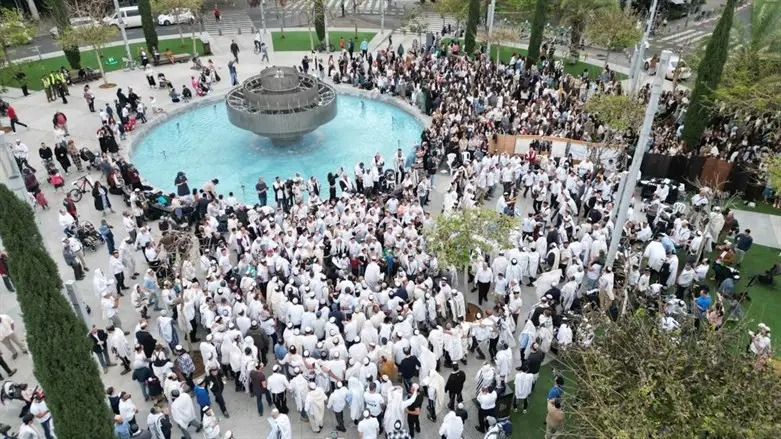In the wake of the Tel Aviv municipality’s decision to ban a mechitzah between men and women at the Yom Kippur tefillah at Dizengoff Square, an urgent administrative appeal was filed against the municipality.
“The decision marks a new low in the in the history of the State,” the appeal by the Freedom and Human Dignity Forum in Israel states. “Since the British Mandate, there has never been a prohibition on a mechitzah in Eretz Yisrael – until now.”
“The tefillah had become a focus of attraction for a broad and diverse public. Religious, traditional, secular – anyone who is interested found their place in the moving tefillah in the city’s streets. The tefilla has taken place every year with a mechitzah in accordance with Jewish tradition and halacha for generations.”
“It should be noted that even Muslim prayers are held in the city with gender separation, using a mechitzah, without disturbance (and legally), as it has already been held in the city’s urban park – Charles Clore Park – a mass prayer and sermon with gender separation, in honor of the Muslim Feast of Sacrifice. Fences that belong to none other than the Tel Aviv municipality served as the mechitzha there.”
“The mass prayer in honor of the Muslim Feast of Sacrifice is held every year in the same format – with gender separation, in the same urban park, using the same municipality’s fences as a mechitzah. Prayers in a similar format are also held on Eid al-Fitr. It is superfluous to mention that these regular prayers are well-known to the municipality.”
“The attempt by the Tel Aviv municipality to prohibit Jewish tefilla with the use of a mechitzha, according to Jewish halacha, is invalid. The municipality lacks the authority to create such a prohibition, out of nowhere.”
“The prohibition on the use of a mechitzah for Jewish tefillah (and specifically Jewish tefilah) is not only illegal but also unconstitutional. The prohibition on conducting Jewish tefillah according to Jewish halacha and tradition violates the basic rights of the mispallelim, including the rights to freedom, dignity, autonomy, religious freedom, and equality.”
(YWN Israel Desk – Jerusalem)












6 Responses
It was discussed before but keeps coming back for more. What Halacha requires a Mechitza in this situation?
A Mechitza is only required in an “Established” Shul (I’m no posek but a Shul with regular Minyanim, a Rabbi, a proper space is definitely “Established” While a Shiva house is definitely not an “Established” Shul for obvious reasons.)
How is a once a year, no formal building, no membership, not chartered with the govt (as a non-profit or otherwise) considered an “Established” Shul requiring a Mechitza?
The wicked T.A. municipality already banned מחיצה for יום-העצמאות services, so even the Mizrachis whould be livid furious at T.A. municipality
I’m in favor of the mechitzta but…. legit question- is using an already existing fence the same legally as adding and using a new portable wall? I have no idea
Protest against segregated prayer: Rabbi Levinstein and the CEO of Rosh Yehudi were attacked in Tel Aviv
Dozens of protesters protested against the “Jewish Head” organization in protest of Yom Kippur prayers – in the segregation it maintains in Dizengoff Square | Rabbi Yigal Levinstein and the CEO of the organization were violently attacked and rescued by police | MKs strongly condemn: “A show of hatred; Kristallnacht” | documentation (news)
Yossi Nachtigal . Kikar haShabbat – 20.9.23
Kuvult,
Whether or not a mechitza is obligated, it is certainly a more appropriate way to daven, especially with such a large crowd. Doing so without a mechitza is giving way to reform (as opposed to a shiva house where it is small and informal).
Fighting against a mechitza is definitely a war against religion.
Where is the payed Provocateur gadolhadora in the comments defending the Tel Aviv governments decisions?